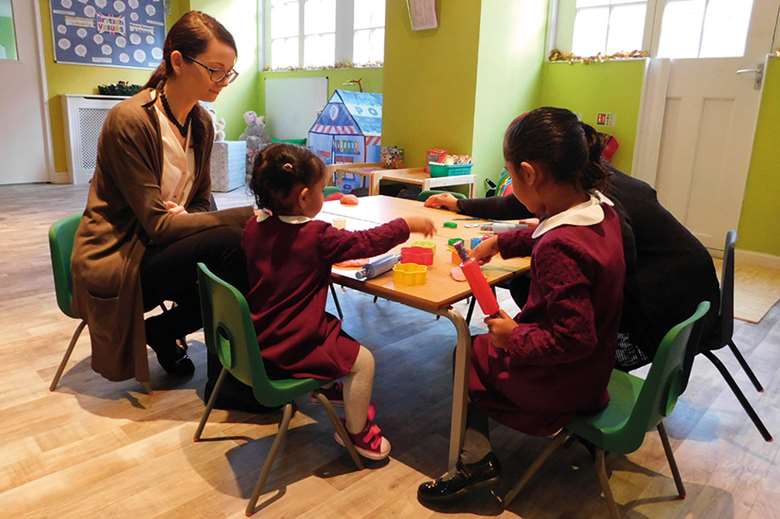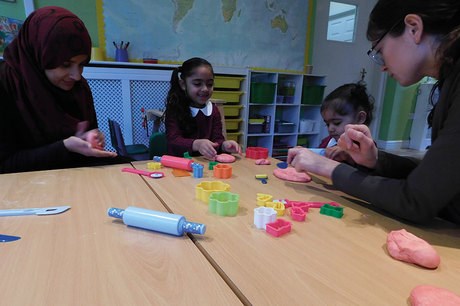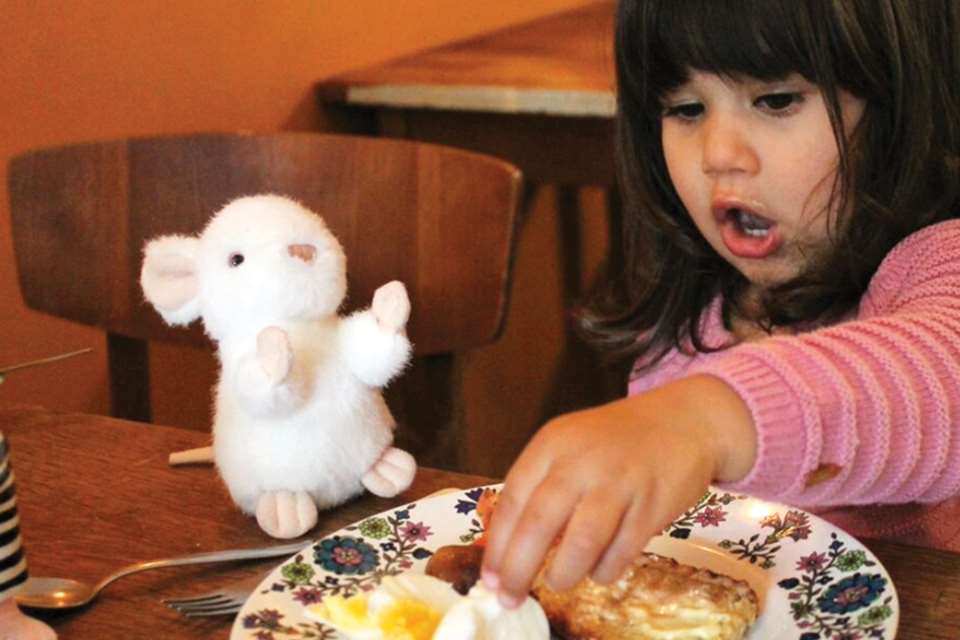Positive Relationships: Working with Parents - Good to talk
Ruth Thomson
Monday, May 1, 2017
A project run by a nursery in the West Midlands with the University of Worcester is helping parents to support their children’s language development, explain Alison Prowle and Nicola Stobbs

Language and communication are vital skills that all children need to learn if they are to thrive and meet their potential. However, research has shown that many of the most disadvantaged children may not be receiving the early help they need in order to enable their language skills to flourish.
Research suggests that even by the age of two years, children in low-income families may already be six months behind their peers in language development, a gap that may have grown to more than two years by the time they enter school at age five (see More information). With a recent report by Save the Children suggesting that one in five children in the UK have lives blighted by poverty, providing early intervention to support children’s language development becomes an urgent priority.
Research has consistently shown that both parents and early years practitioners can play an important role in helping children develop these crucial skills. Inspired by an innovative language enrichment project in the US, called Providence Talks, Zadvinder Padda, founder of GNG Nursery and the recently opened Fireflies Nursery, both in Smethwick, has established a similar intervention programme to support children in the West Midlands.
Smethwick is a vibrant, multi-ethnic urban community, situated four miles west of Birmingham. Many of the children living in the area are in low-income families; indeed, Smethwick is in the lowest third of communities in England when measured against the Income Deprivation Affecting Children Index (IDACI).
Children in Smethwick underachieve at all key stages when compared with other communities in England, and as GNG nursery manager Dovile Baikauske points out, many of the children arrive at nursery with low baselines, especially in speaking and listening.
SPEECH PATTERNS
As part of its drive to widen participation in education, The University of Worcester provided two specialist researchers to work alongside the nursery to develop an exciting new project, which adapted the Providence Talks strategies for a local audience. The premise of the project was simple; we wanted to find out if supporting parents in Smethwick to provide a language-rich environment would have a positive impact on children’s development. The project took place over a year and involved 14 self-selecting or invited parents, who were divided into three pilot groups.
The first stage of the project was to monitor the children’s current speech patterns, using small bespoke recording devices. This provided a baseline for each child. Parents in the first group attended an interactive training session where they were given simple strategies to support their children’s speech. These strategies were adapted from the original Providence Talks project and were based around the following three Ts:
Tune in to your child.
Talk more with your child.
Take turns when talking and playing with your child.
However, following the first group’s feedback, three further strategies were added:
Turn off devices when playing and talking with your child.
Time for tea together (using mealtimes to develop positive interactions).
Tell a story (using an age-appropriate picture book and/or props).
The parents were asked to use the strategies as often as possible, but were also given the message that even ten minutes of quality talk time repeated throughout the day can make a big difference to their children’s speech. The children’s speech was then monitored, using recorders, over a period of several weeks in order to monitor progress.
For the first two groups, recordings took place in the nursery only, but in the third group, additional recordings took place in the family home. Parents and practitioners in the setting were given journals to record their own reflections as the project progressed. Narrative observations were undertaken by the researchers and provided rich data. At the end of the recording period, both parents and practitioners were invited to take part in interviews and focus groups to provide their perspectives on the benefits and limitations of the project.
CHANGING SIMPLE BEHAVIOURS
The findings from the pilot project were encouraging. All children within the study experienced some improvement in their language. For some children this presented as an increase in words spoken, while for others it was observed in the quality of their interactions (such as using a wider vocabulary or increasing complexity of sentences). The staff at the nursery reported that the participating children were more confident within the setting. Parents reported a range of benefits from the project; not only did they report that the children were talking more, but also that family relationships, routines and parental confidence have all been enhanced.
 Gemma Ameen, who took part with her four-year-old daughter Lian and her three-year-old son Aran, summarised her experience within the project as follows:
Gemma Ameen, who took part with her four-year-old daughter Lian and her three-year-old son Aran, summarised her experience within the project as follows:
‘There is so much information out there for parents that you never really know what is the right thing to be doing. It was really good to be part of this project and to see how changing simple behaviours could have a really positive impact. We had got stuck in a routine of using the TV and iPads, I guess we took the easy option. I feel much better now in myself and am very proud of both of my children.’
 Another parent, Mrs Rakhi Raval, talked about how using the strategies had improved routines at home, facilitating better family relationships:
Another parent, Mrs Rakhi Raval, talked about how using the strategies had improved routines at home, facilitating better family relationships:
‘What I have learned is to try and get Dia more involved in the things I’m doing. She helps to set the table and we interact more. We have cut down on the TV a lot and we now sit down and play more. Her personality has changed as a result and she’s more willing now to talk about her feelings. There is better communication between us, and as a result a greater bond.’
The nursery’s Ms Baikauske says the project has provided benefits for all involved – children, parents, staff and management:
‘Children who at first were shy and would find it hard to separate from parents became leaders of their friendship group, were happy to answer questions, showed interest in topics discussed and asked more questions to develop their knowledge further. We noticed improved parent relationships with the setting and among themselves. They realised that other parents go through the same issues, problems or achievements with their children. It allowed for a safe space where ideas and thoughts can be shared.
‘It was amazing to watch these parents open up, share and support each other. The parents were showing interest in children’s learning and discussing strategies to support language. They were happy to be more involved in the nursery as they understood the importance it made for their children. It is testimony to this project that one of the parents become a valued member of our staff team afterwards.
‘Our staff developed great knowledge of language learning through working with the university. The “T” strategies were also implemented in nursery and we noticed all children benefiting from these new approaches, including babies. Although we did not record this age group as part of project research, we certainly did have a very vocal group of babies.’
Following such positive evaluation of the pilot project, Mr Padda is now working in partnership with the University of Worcester to secure grant funding in order to undertake a larger-scale project within GNG and Fireflies Nursery.
‘The results of this pilot have been fantastic,’ he says. ‘We have seen a real improvement, not only for the children taking part directly, but for all the children in the nursery. We really want to scale the project up now and make sure that, educationally, this is the right thing to be doing.
‘We really believe that this project has the ability to get families talking more, improve children’s communication, and improve parent’s confidence, and maybe even their employment prospects. Once we’ve got it right, we want to share it with the sector. For myself and our management team, this pilot has been a great opportunity to ensure that as an Outstanding award-winning nursery we continue to find best ways to support children in the most vital years of their life.’
Alison Prowle and Nicola Stobbs are senior lecturers at the Centre for Children and Families, University of Worcester.
MORE INFORMATION
http://news.stanford.edu/news/2013/september/toddler-language-gap-091213.html







